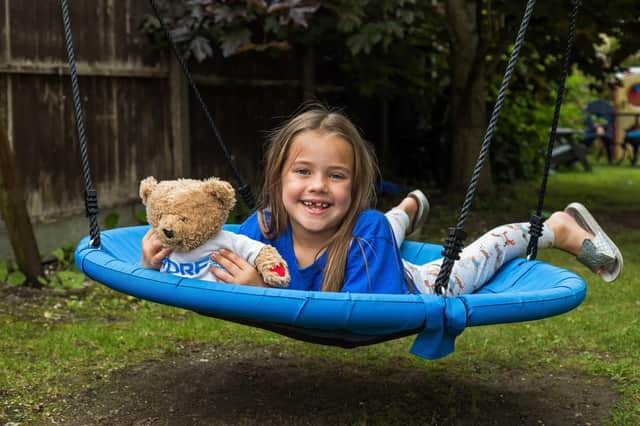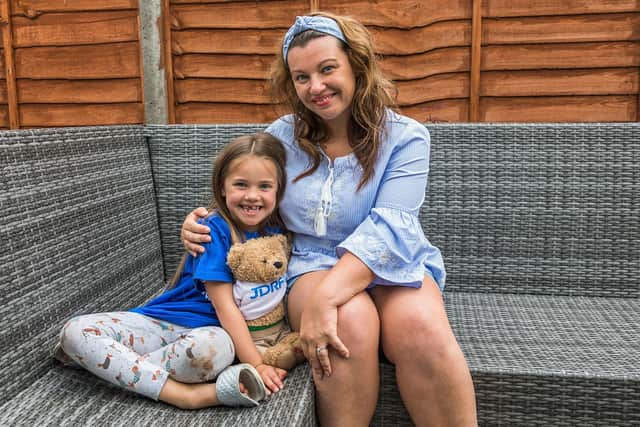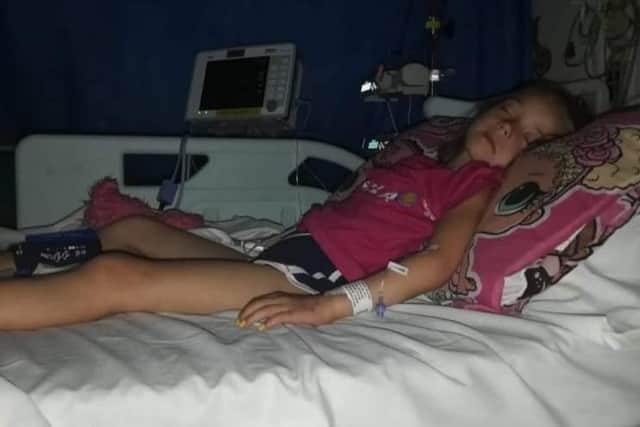Bella's life was changed forever by diabetes diagnosis aged six | BIG READ


The news that their little girl had a potentially dangerous condition was a ‘complete shock,’ as diabetes was not something that ran in the family and certainly not something they had ever considered a possibility.
Fast-forward a year and not only has Bella, now seven, got her symptoms under control but she has learnt how to inject her insulin herself - and is even in the throes of organising a fundraiser for a diabetes charity.
Advertisement
Hide AdAdvertisement
Hide AdHowever, prior to her life-altering diagnosis it was quite a different picture for the Champion family, who live at Horndean.


Bella’s mum Donna, 38, explains: ‘I had noticed Bella was sleeping a lot more than usual and had lost a bit of weight – and she just wasn’t herself.
‘But because we were in Covid times it was a bit difficult. I spoke to someone on the phone who asked if she was eating and drinking, which she was, and so we couldn’t go in to see a doctor.
‘A couple of weeks passed and things weren’t right, we kept finding her asleep halfway up the stairs and things like that. On the Friday that week I was able to get an appointment for two weeks’ time.
Advertisement
Hide AdAdvertisement
Hide Ad‘But by Sunday she had lost six pounds in weight, which was really noticeable for someone her age. We took her straight to A&E.


‘Within 45 minutes she was diagnosed with type 1 diabetes.’
Bella was admitted to Queen Alexandra Hospital that day where she was given a cannula due to her dehydration as well as insulin, and two days later she was able to come home.
Unlike type 2 diabetes, which is often linked to diet and lack of exercise, type 1 occurs when the body cannot produce enough of a hormone called insulin, which controls blood glucose.
Donna, who works at QA Hospital herself, adds: ‘Bella needs around four injections of insulin a day – at breakfast, lunch, dinner and then a slow-release one at bedtime.
Advertisement
Hide AdAdvertisement
Hide Ad‘And if she has anything extra like a snack she will need another injection.
‘At first it was difficult, she was very brave getting the injections – no child likes them. Imagine telling a six-year-old child who doesn’t like injections, we’ve got to do this for the rest of your life?
‘But things are a little easier now and her school, St Peter’s at Waterlooville, has been brilliant with all this and has been really understanding.
‘She’s the only child in her school with type 1 diabetes so it was a learning experience for everyone.
Advertisement
Hide AdAdvertisement
Hide Ad‘She started giving her own injections only two months after her diagnosis, which is amazing. She’s also able to use a scanner on her arm to check her blood sugar levels.’
Now Bella has set her sights on helping other children in her situation and is raising money selling tombola tickets, including prizes donated by local companies and friends and family, to be drawn on July 26 – marking a year since her diagnosis.
The cash will go towards the Juvenile Diabetes Research Foundation (JDRF) which supported Bella and her family over the year.
The charity also provided Bella with her favourite teddy bear called Rufus, who is specially designed to show children where they can inject insulin.
Advertisement
Hide AdAdvertisement
Hide AdDonna says: ‘The fundraising started because Bella thought if she could raise money to buy 20 Rufus bears for other children that would be great.
‘We looked on the website and saw they cost £10 each.’
But with tombola tickets snapped up by all Bella’s friends and relatives, she has surpassed her target, raising a staggering £1,200 so far.
Bella adds: ‘I’m raising money for JDRF so they can find a cure for type 1 diabetes.’
Above all though the Champion family, including Bella’s three-year-old sister Clementine and dad Mark, 41, are grateful to be together.
Advertisement
Hide AdAdvertisement
Hide Ad‘We were told if we’d taken her to A&E just a week later Bella would have been in a coma,’ Donna says.
‘That’s why it’s so important people can recognise the signs of type 1 diabetes – it wasn’t something we knew before.’
To find out more about type 1 diabetes or donate money to the JDRF, visit jdrf.org.uk.
What is the difference between type 1 and type 2 diabetes?
Both forms of diabetes cause the level of glucose (sugar) in your blood to become too high – however, for different reasons.
Advertisement
Hide AdAdvertisement
Hide AdWith type 1 your body attacks the cells in your pancreas which means it cannot make any insulin. It is not yet known what the cause is.
However, with type 2 your body is unable to make enough insulin or the insulin you do make doesn’t work properly, and is often linked to weight or a family history of diabetes.
Unlike type 1, for which there is no cure, evidence shows that certain measures can prevent type 2 and put it into remission.
They share symptoms including feeling very thirsty, going to the toilet more than usual, particularly at night, feeling very tired, losing weight without trying, thrush that keeps coming back, blurred vision and cuts and grazes that are not healing. But symptoms for type 1 tend to appear quickly, whereas type 2 is more gradual.
Advertisement
Hide AdAdvertisement
Hide AdType 2 is also much more common. Around 90 per cent of people with diabetes have type 2, while eight per cent have type 1.
If you suspect you could have either type of diabetes, contact your GP.
A message from the editor, Mark Waldron.
You can subscribe here for unlimited access to our online coverage, including Pompey, for 27p a day.
Comment Guidelines
National World encourages reader discussion on our stories. User feedback, insights and back-and-forth exchanges add a rich layer of context to reporting. Please review our Community Guidelines before commenting.